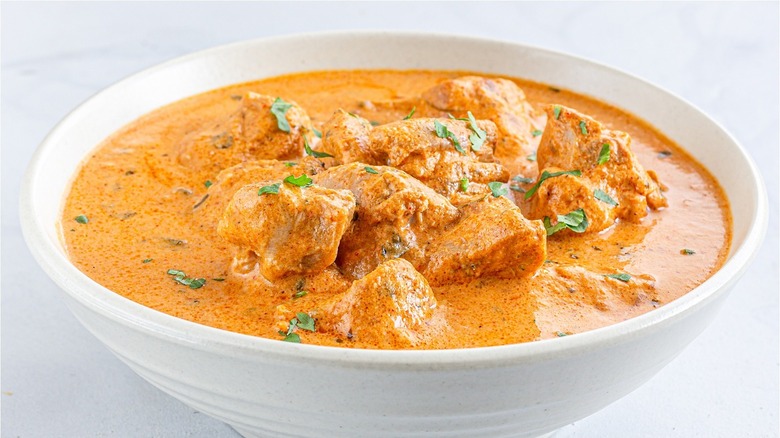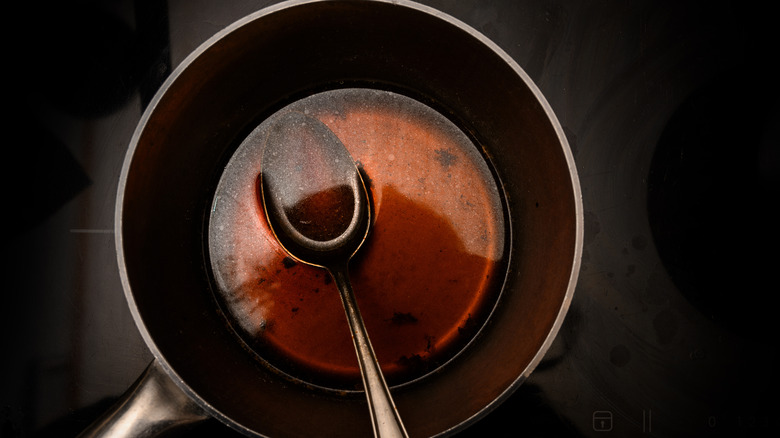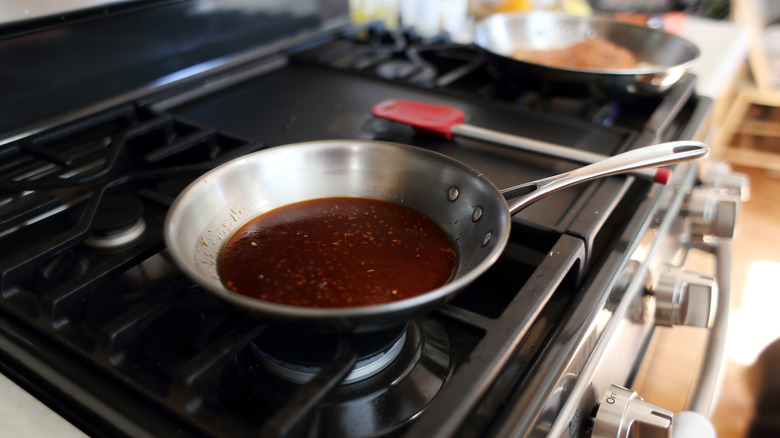The Secret Ingredient For Glossy Sauces
For some, capturing the magic of a restaurant meal is simply impossible to do at home. While that may be the case in terms of ambiance, and the entire expereince of going out for dinner, there is no reason that your home-cooked food shouldn't be as high-quality as restaurant food. Especially today, you can source amazing, high-end ingredients online or at specialty markets. In addition, there is a wealth of information in terms of proper cookery, specific seasonings, and special flavorings at your fingertips. Interestingly, Chef Keith Sarasin says that restaurants often use more salt and butter than some home cooks might think necessary – which is certainly a valid point (via HuffPost).
One other component that often differs between restaurant cookery and home cooking is the use of sauces. For some, whilst cooking at home, the aim is the standard matrix of protein + veg + starch. There may also be a salad or appetizer served, but rarely is there a sauce used to tie the entire meal together. This kind of disparate approach to meal planning is not one that is usually employed in restaurants, in which these components are often finished off with a silky sauce. Looking to capture that kind of glossy, perfect sauce at home? Look no further.
The key ingredient for glossy, rich sauces
Many often speak about the "secrets" of restaurant cookery. Heck, Anne Burrell even hosted a Food Network show literally called "Secrets of a Restaurant Chef." In so many instances, though, there are no secrets employed — just techniques, special methods, and a different approach to timing and serving than you'd have at home.
The sauce itself really is not especially challenging. It usually contains nothing more than some aromatics, oil or butter, wine or stock, and possibly some cream or herbs, according to The Culinary Pro. One of the main tips to achieving that perfect sauce? Butter – lots and lots of butter! Adding a pat or two of butter at the end of making your sauce rounds out the flavor and adds a silky, glossy note, according to AllRecipes. While the butter adds the trademark "restaurant-level glossy sheen and richness," it's also very important to be mindful of your salt level. If the sauce is already well made and perfectly seasoned, adding salted butter may throw off that balance and produce a salt bomb. Be sure to use unsalted butter in order to maintain the perfect seasoning level.
Important sauce tips and tricks
Some other important points when making top-notch sauces, include using pans that aren't non-stick — so the fond from your previously cooked food adds flavor — discarding extra fat, and using cold butter that is whisked in towards the end of the cooking process. This helps not only flavor and add sheen, but also emulsifies the sauce, "round[ing] out the flavors and [giving] the sauce a terrific mouthfeel," according to Food & Wine. So, it seems achieving perfect sauces is well within your culinary reach.
Reluctant Gourmet lists some iconic sauces and reductions, from hollandaise, pesto, pistou, and components such as demi-glaces. There's really no end to the amazing sauces you can use to enrich your best dishes. Of course, the cookery of your protein, vegetables, and starches is just as important, but in so many instances, it's the sauce work that makes your dish truly memorable and flavorful. Perfect your sauce techniques and you'll be serving restaurant-level gems in no time.


